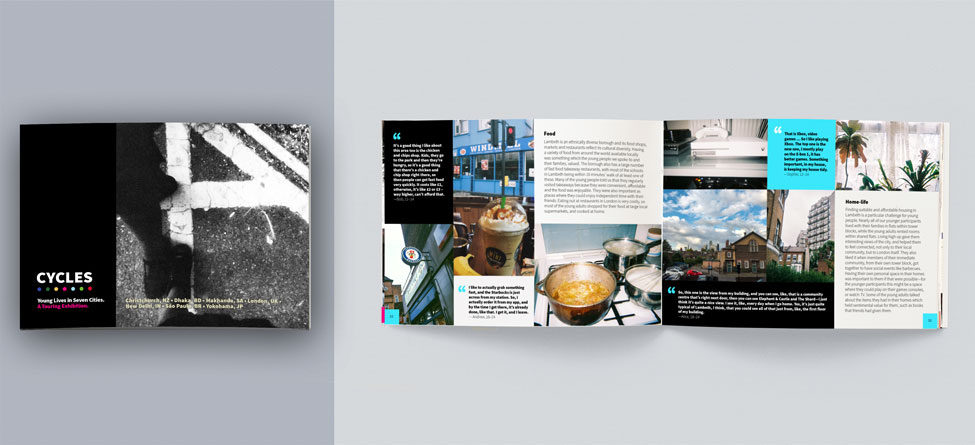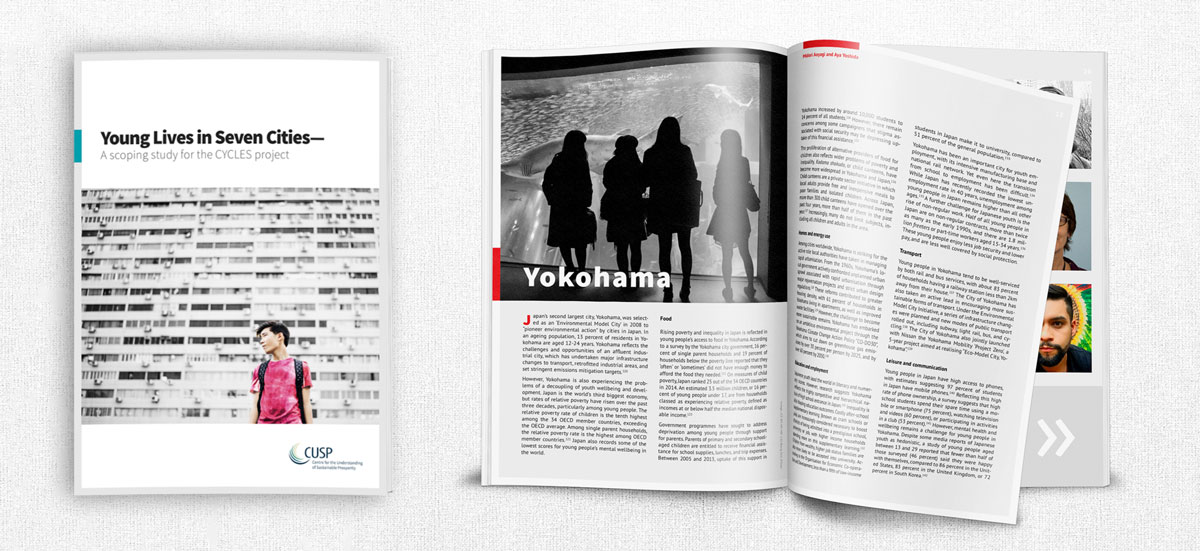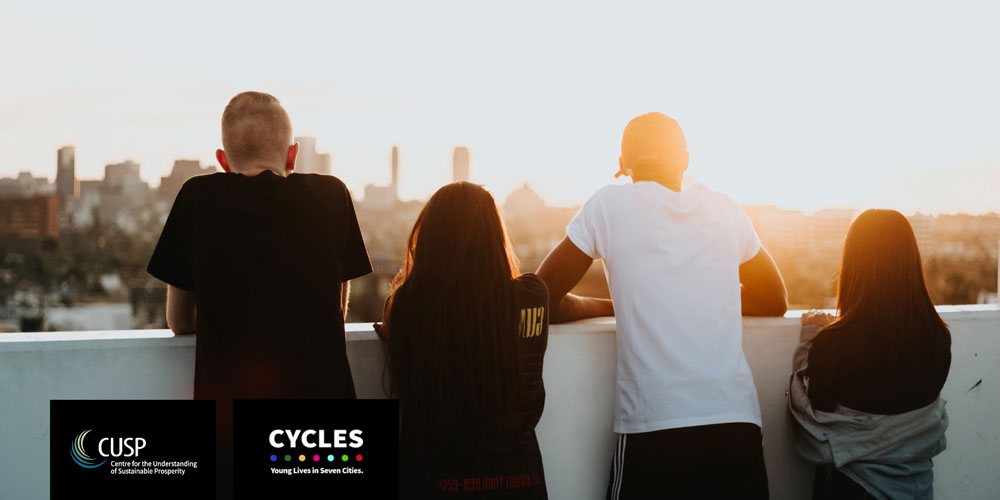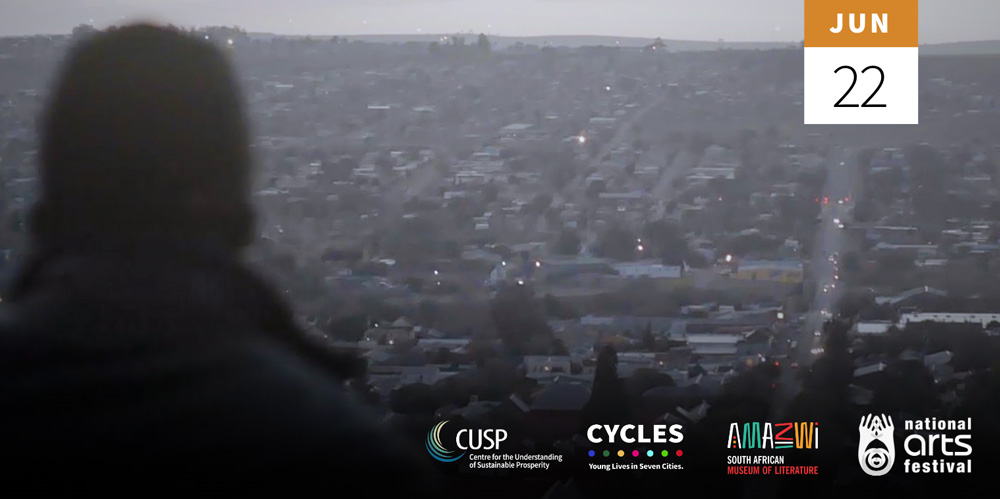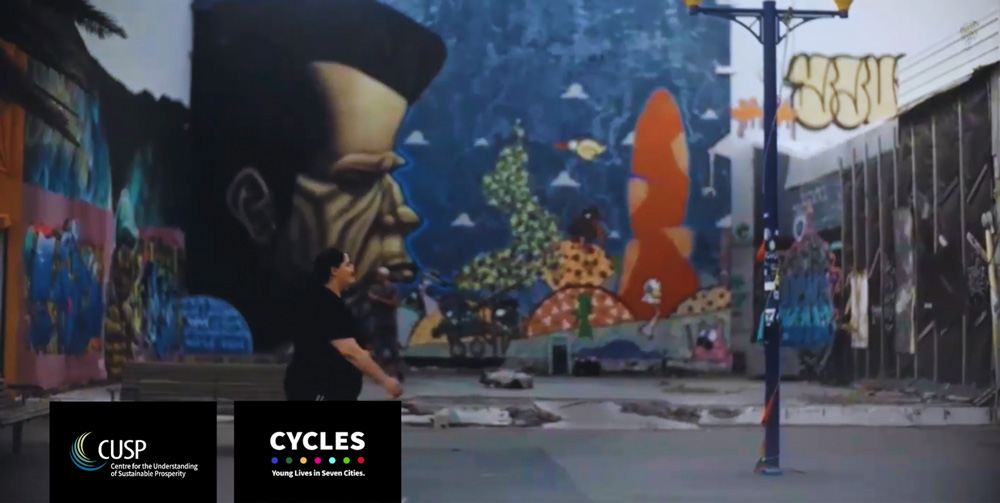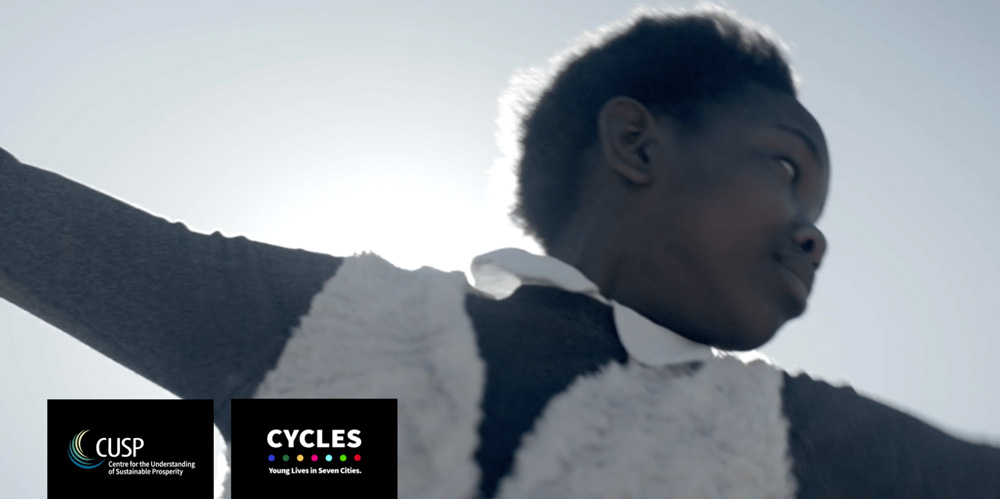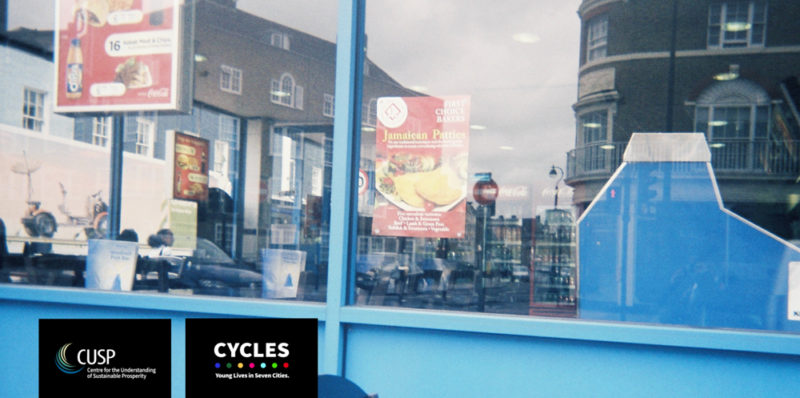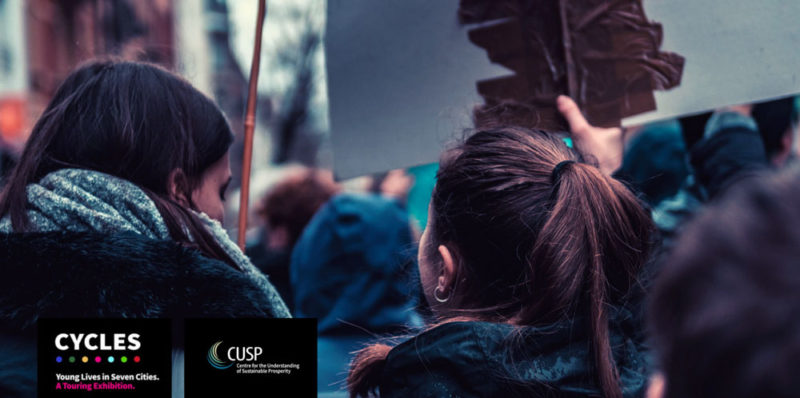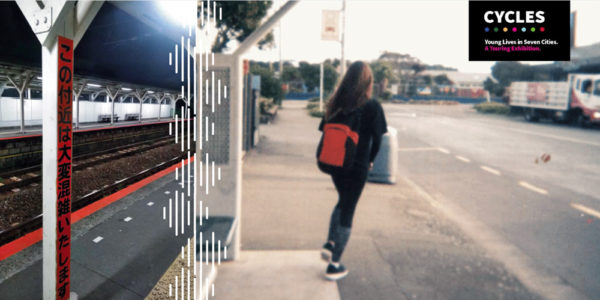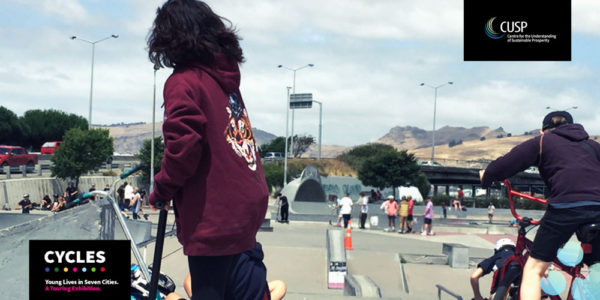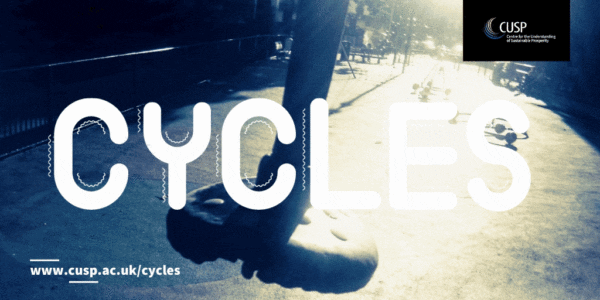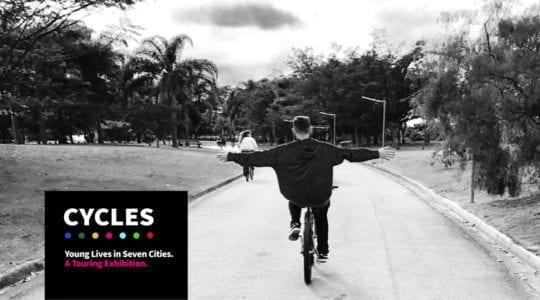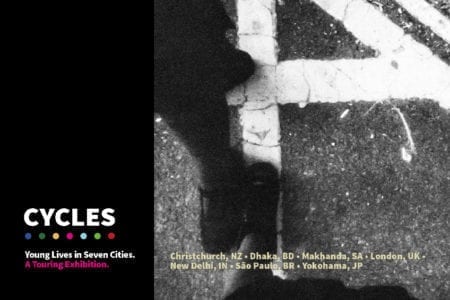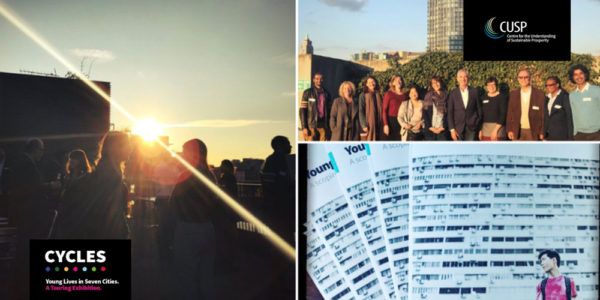THEMES / SOCIETAL UNDERSTANDINGS / CYCLES
CYCLES | Children and Youth in Cities—Lifestyle Evaluations and Sustainability
Cities are youthful places. By 2050, seven out of ten young people will live in an urbanising area. Cities are also centres of consumption. Urban areas cover two percent of the world’s land area, but they are sites of 70 percent of resource use and greenhouse gas emissions. Understanding the lifestyles and aspirations of young people living in cities motivates the CYCLES project, a study of the lives of young urban citizens aged between 12 and 24 years living in very different cities and contexts. Our aim in CYCLES is to identify and share young urban experiences and ideas for living well within environmental limits.
Publications
- City brochures: For each city we show young peoples’ evaluation of how satisfied they are with their lives, what they consider is most important for living well and what they identify as the best and worst things about their city.
- Exhibition catalogue: In each city, small groups of young people, aged from 12–24, took photos or drew pictures to illustrate ‘a day in our lives’ and then discussed their images with us, focusing on what they valued and what they would like to change. We created a travelling exhibition from these pictures.
- Scoping study: This report provides an initial sketch of our first seven case study cities, drawing from in-depth audits compiled by our research teams in the seven locations.
- Academic outputs: We also publish our findings in peer-reviewed academic journals.
CYCLES is based in seven cities that span six continents, including some of the world’s largest mega-cities with 10 million inhabitants or more.
They also include small cities of fewer than 500,000 inhabitants, where nearly half of the world’s 4.1 billion urban dwellers reside.
Namely, our partners work in Christchurch, NZ • Dhaka, BD • Makhanda, ZA • London, UK • New Delhi, IN • São Paulo, BR • Yokohama, JP.
Research Methods
Our research involves a three-step process using a range of methods, with results analysed by local research teams under the coordination of CUSP, and shared globally via reports, exhibitions, film, and local outreach.
Step 1 | City contextual reviews: understanding local sustainability challenges
CYCLES began with desk-based reviews of sustainability challenges, opportunities and interventions in each city. The report can be accessed in pdf.
Step 2 | Focus groups and photo elicitation: “A day in our lives”
Interactive focus groups, interviews and photo diaries compiled by young city residents provided culturally relevant insights into young people’s everyday consumption, what they value, and their aspirations for the future. To celebrate ‘A day in our lives’, we developed an exhibition, on show between Nov 2018 and January 2019. The catalogue can be accessed on the exhibition page.
Step 3 | Quantitative city surveys: “How we live now”
Building from the ‘a day in my life’ small scale insights, a mixed method online survey of wider populations in these cities will inform city, regional and international best practice.
Celebrating Young Urban Lives
Our exhibitions (the first one on show at The Foundry, from Nov 2018 to January 2019) celebrate everyday aspects of young people’s urban lives—yet issues emerged across our seven international cities which demand attention. Secure homes and rewarding relationships were identified as central to youth wellbeing but the practicality of heating or cooling homes, and affording accommodation with space for intergenerational lifestyles is creating strain for many. Other issues emerged too: the need for secure streets and regular affordable public transport; access to green spaces; clean water and air. The pleasure that young people take from interaction with friends and the value they place on freedom to get around their city was evident. Education stress, precarious employment, loss of green space and youth mental health are key priorities, but so too is celebrating the places and activities urban young people value.
Ethics
All research teams followed UNICEF’s guidelines for Ethical Research Involving Children (ERIC), with the research carried out by University teams conforming to the requirements of their Ethics Committees. For more details about how the research was carried out, please see our exhibition catalogue, or contact Sue Venn.
Project News
We are on the road again! CYCLES exhibition and CUSP sessions at Youth Studies: Collaboration, Creativity and Complexities | Manchester Conference 26-27 June 2019 https://t.co/jHXRZVcioA @kateburningham @nastalief @manmetuni #YoungLives7Cities via @CUSP_uk
— Susan Venn (@DrSueVenn) June 10, 2019
Young Lives in Seven Cities—Our international research team coming together for the CYCLES launch tonight, 5-7pm >> https://t.co/f3ULWSVatX pic.twitter.com/c58M8vTt7R
— CUSP (@CUSP_uk) September 19, 2017
Ever fantastic @ProfTimJackson from @CUSP_uk moderating a panel discussion on CYCLES, @swechhaindia on the panel too. pic.twitter.com/xp8PDjZBQH
— Vimlendu Jha (@vimlendu) November 7, 2018
Our CYCLES exhibition features for example the frustrations and joys of young people’s lives in Jagdamba Camp, #NewDelhi. Delighted to be partners with @swechhaindia who work “to inspire a just, equitable and sustainable society”. #YoungLives7Cities cc @vimlendu pic.twitter.com/z5yVQvqZrb
— CUSP (@CUSP_uk) November 7, 2018
Very much looking forward to the #younglives7cities event tonight @aplaceforchange with @EqualitiesWork exploring what it means to be a young person in seven cities across the globe. The young people discuss different themes inc education pic.twitter.com/owYoeN1G5z
— Cassie Edmiston (@CassieEdSmith) November 7, 2018
#YoungLives7Cities @KateBurningham1 introducing the panel tonight. pic.twitter.com/kxHO6kTO6J
— CUSP (@CUSP_uk) November 7, 2018
‘Two quid, chicken and chips, done’—@KateBurningham1 and @DrSueVenn to present CYCLES study findings on #SustainableConsumption and young people’s consumption of fast food at the forthcoming @BSAConsumption launch event, 🗓22 Jan >> https://t.co/nN9DfPNFVs
— CUSP (@CUSP_uk) December 4, 2020
#YoungLives7Cities pic.twitter.com/W8jPSkKAVi
Working in #Lambeth with 12-15 year-olds? Please contact us if you are interested in getting involved! If you'd like to help but can't get involved please R/T so we can reach more people – thank you ☺️ https://t.co/dvUjs6JvGP
— Anastasia Loukianov (@nastialef) October 8, 2020
@KateBurningham1 talking about our CYCLES work and #younglives7cities exhibition at FASS festival of research @CUSP_uk @BMHayward pic.twitter.com/SKuzCHkjSj
— Susan Venn (@DrSueVenn) January 24, 2019
#YoungLives7Cities exhibition opening tonight at The Foundry, @aplaceforchange with our international research partners >> https://t.co/NGxpCCPS1E The exhibition will be on show until January. Drop by when you are in Vauxhall. pic.twitter.com/xsIpR7QAzo
— CUSP (@CUSP_uk) November 7, 2018
Young lives in cities. Our new global study project CYCLES launched today w the international team. More info >> https://t.co/AUUocTkoYu pic.twitter.com/cH94Cqn0S3
— CUSP (@CUSP_uk) September 19, 2017
A sneak preview today at Nature of Prosperity event of a much bigger exhibition #younglives7cities being launched on 7 Nov. Get in touch for an invite https://t.co/KChlTKBZLy #PurposeSP @CUSP_uk @BMHayward @SENissen pic.twitter.com/KL2AMoyXWW
— Susan Venn (@DrSueVenn) October 24, 2018
We launched! Thanks to everyone: especially Rāhera Cowie @ucnz , Anne Galloway of @ChristchurchCC and the fantastic team at @ChristchurchLib we launched the @CUSP_uk exhibition on Young lives in 7 cities & Otautahi Mataora chch living! Survey starts today pic.twitter.com/M5Z1VvHg0c
— Bronwyn Hayward (@BMHayward) March 18, 2020
#YoungLives7Cities | https://t.co/gtvMfANB5M https://t.co/e9nar9Utxp
— CUSP (@CUSP_uk) July 21, 2020
Exciting! installing an exhibition about how youth can live well in 7 world cities in Tūranga Christchurch to mark the roll out of a city wide survey with @ucnz & @CUSP_uk come along to the opening Wed 5.30 https://t.co/yl1Dla2yCd @ChristchurchLib pic.twitter.com/SNMwd4XhHQ
— Bronwyn Hayward (@BMHayward) March 16, 2020
#YoungLives7Cities | https://t.co/bvnK23e3sx https://t.co/M6W3qGLdov
— CUSP (@CUSP_uk) July 13, 2020
touring exhibition @aplaceforchange #younglives7cities pic.twitter.com/OdypNKyHOv
— Laura Haber (@laurahaber01) January 10, 2019
#YoungLives7Cities Despite a lot of commonalities, each of the seven cities come with their very own challenges. The panelists sharing the main insights >> https://t.co/C1PZjjZ7Bx pic.twitter.com/mgWw5NWohB
— CUSP (@CUSP_uk) November 7, 2018
Young people and environmental affordances in urban sustainable development: insights into transport and green and public space in seven cities | New journal paper from our CYCLES study #YoungLives7Cities >> https://t.co/EmfMbqbfsR cc #SDG11 pic.twitter.com/SHUEPGSImi
— CUSP (@CUSP_uk) October 30, 2020
Fantastic to hear @mmhasan_85 talking about young people's experiences with public transport and green space in Dhaka. Third place winner @UCNZ College of Arts 'Thesis in 3' comp pic.twitter.com/zJyiAnXxS7
— Kate Prendergast (@drkateprend) August 2, 2019
Yahoo! Conference day at #CCCconf19 on co-creation with young people with @mcys_mmu @ManMetUni
— Ben Bowman (@bennosaurus) June 26, 2019
love the exhibit (& postcards!) from @CUSP_uk & #younglives7cities pic.twitter.com/bSp5XEyJay
As with all our CUSP work, we aren’t just interested in understanding for its own sake. We want the CYCLES research to be something which can be used by city planners, local authorities, by community groups, by businesses who are interested to improve the quality of life for young people in their cities. Listen to CUSP Deputy Director Kate Burningham briefly outlining the context and wider purpose of our project, and what the next steps are — in the video below:
Project Management
In 2014, UNEP funded researchers from the Sustainable Lifestyles Research Group at the University of Surrey, UK (Prof Tim Jackson, Dr Kate Burningham and Dr Sue Venn) and the University of Canterbury, Christchurch, NZ (Prof Bronwyn Hayward) to develop the initial project methodology for CYCLES. CYCLES is now part of CUSP. An International Advisory Board of key experts in youth and sustainability research will support and inform the vision and impact of CYCLES. Members are Dr Stefanos Fotiou, Professor Golam Moinuddin, Dr Patricia Pinho, Dr Pritpal Randhawa, Mary Richardson, Professor Juliet Schor, Dr James Sloam, Professor Takako Takano and Penny Urquhart.
Lead researchers are: Bronwyn Hayward, Kate Burningham, Anastasia Loukianov, Sylvia Nissen, Kate Prendergast, Sue Venn and Tim Jackson.
Partners are:
- Ingrid Schudel, Mandilive Matiwane, Patience Shawarira and Lona Musiyiwa, Rhodes University, South Africa
- Helio Mattar, Sofia Ferraz and Michael Oliveira, Akatu Institute for Conscious Consumption, São Paulo, Brazil
- Vimlendu Jha, Aakriti Gupta and Tanvee Kakati, Swechha, New Delhi, India
- Midori Aoyagi and Aya Yoshida, NIES, Tsukuba, Japan
- Mohammad Mehedi Hasan, CUSP, University of Canterbury NZ /Jahangirmgar University Bangladesh
The project in perspective
Bronwyn Hayward, project lead: “It is exciting to bring seven international research teams together to share our insights into challenges facing young people in cities around the world.”
Tim Jackson, CUSP Director: “Our hope is to launch a vital conversation about young people’s prospects for the future. To understand those prospects is to understand the hopes for human development. To improve them is to enrich our own lives.”
Helio Mattar, research lead for São Paulo: “The challenge of sustainable prosperity, when looked at from the point of view of young people, is to guarantee the enabling conditions for young people to feel secure enough to use their abilities and competences in a way that expands their possibilities rather than putting light in their obstacles to prosper. In other words, to unveil the enabling conditions for young people have a bright consciousness of their best possible self to achieve their hopes and dreams in a sustainable way.”
Vimlendu Jha, project lead in Delhi: “India and its youth are going through a rapid transition. We need a common understanding of sustainability, with mutual respect for each others’ approach.”
Midori Aoyagi, who is leading the work in the city of Yokohama adds: “In Japan, kids poverty is a crucial challenge and young people’s lives in Japan are increasingly polarised: some have opportunity, some are living without any hope.”
Lona Musiyiwa, working on the project in Makhanda (formerly Grahamstown), South Africa: “CYCLES is an important project for us in [Makhanda]. Environmental pressures such as water scarcity are a major problem for our youth. Finding ways for young people to manage their future in a sustainable manner is a crucial aspect for us.”
The aim over the next three years is to identify pragmatic ways to help young people across the world achieve their full potential—within the limits of a finite planet. CYCLES will identify and learn from best practices in these communities how to support young people to flourish sustainably.
Contact
For further information, please contact Prof Bronwyn Hayward bronwyn.hayward@canterbury.ac.nz.



